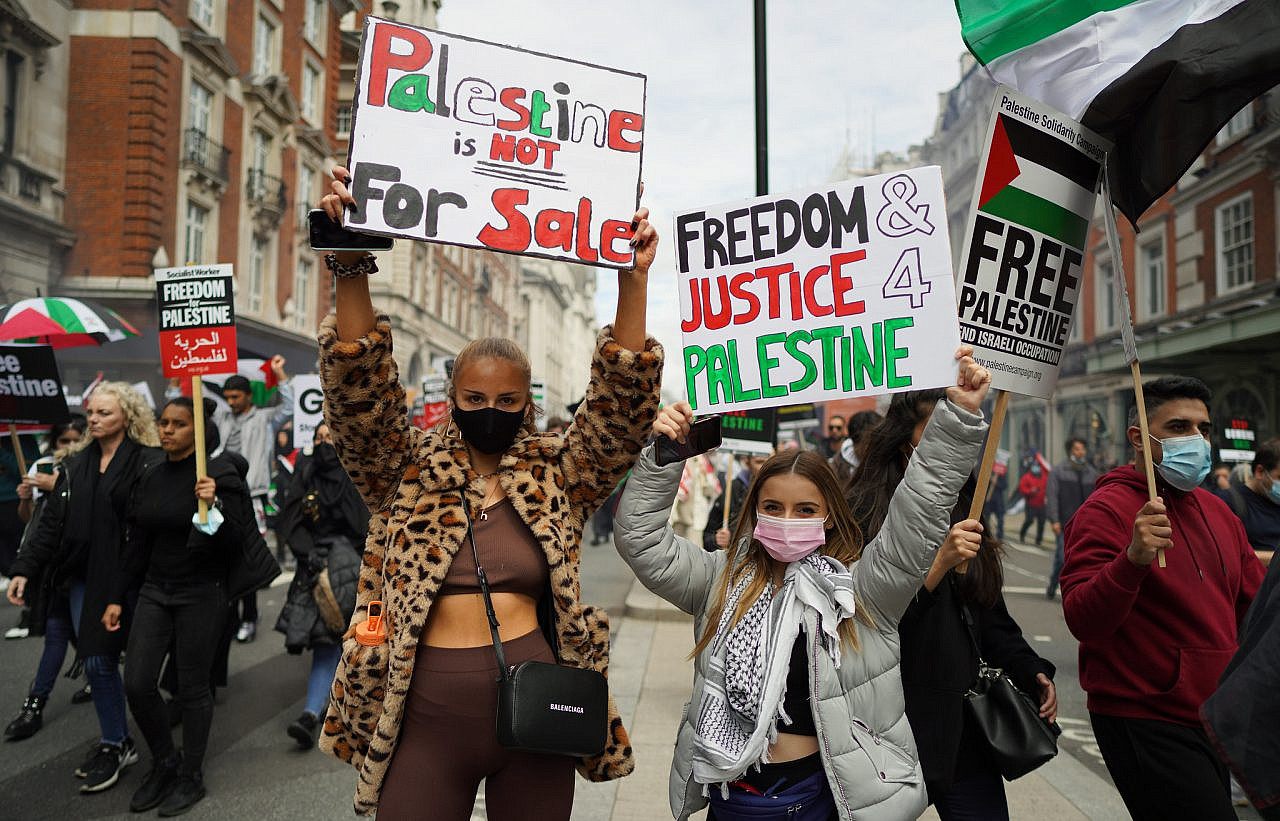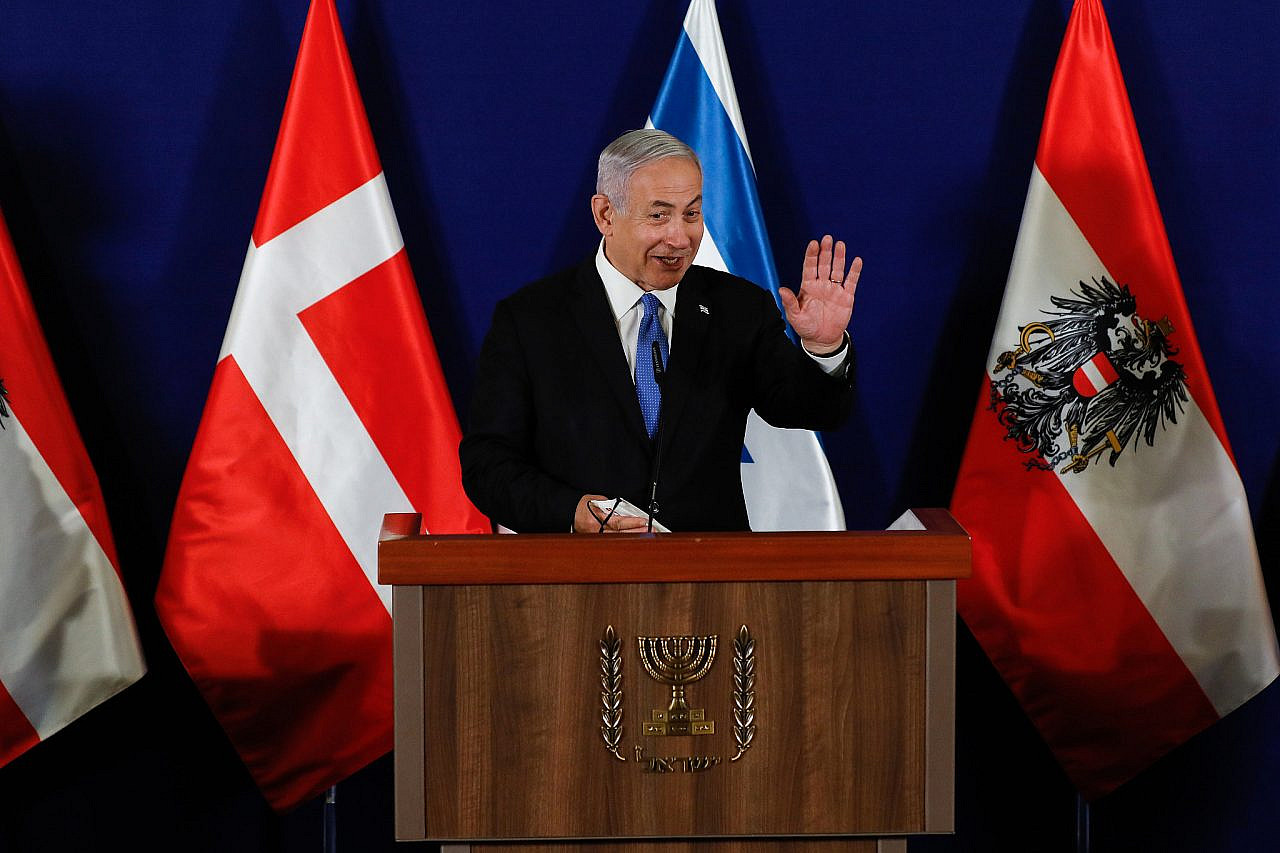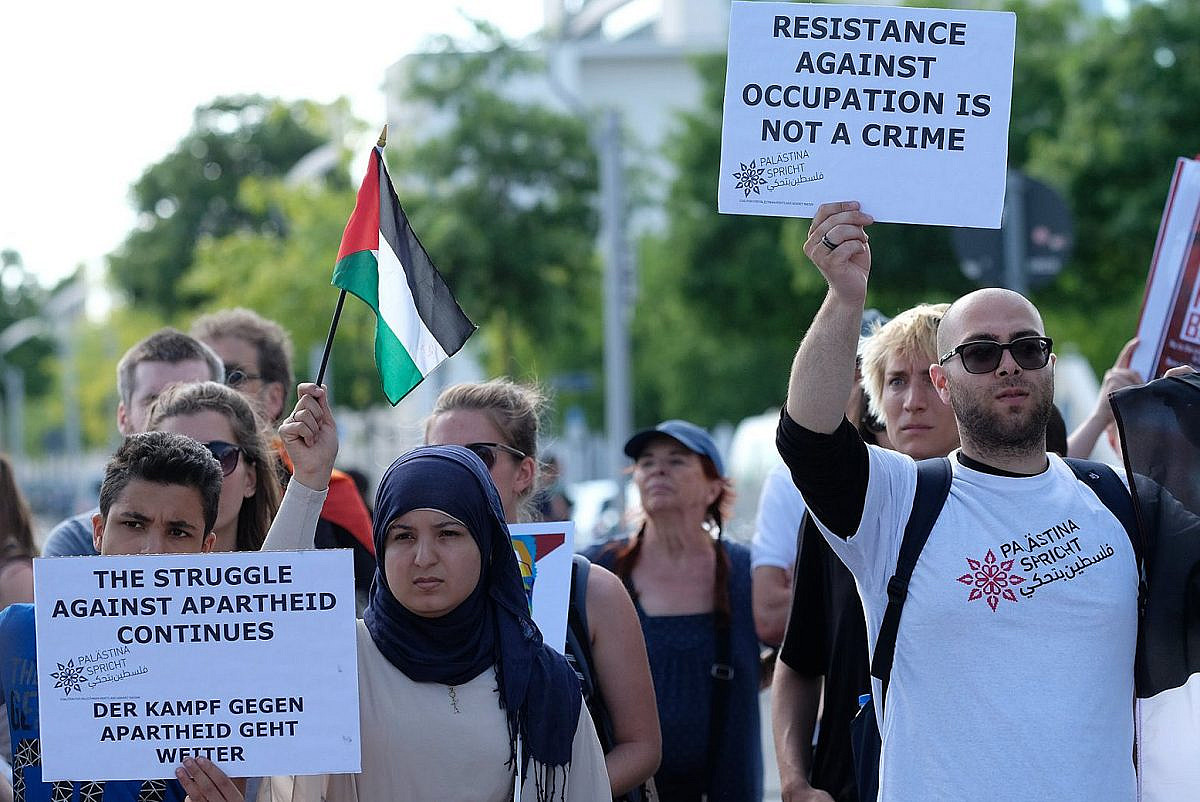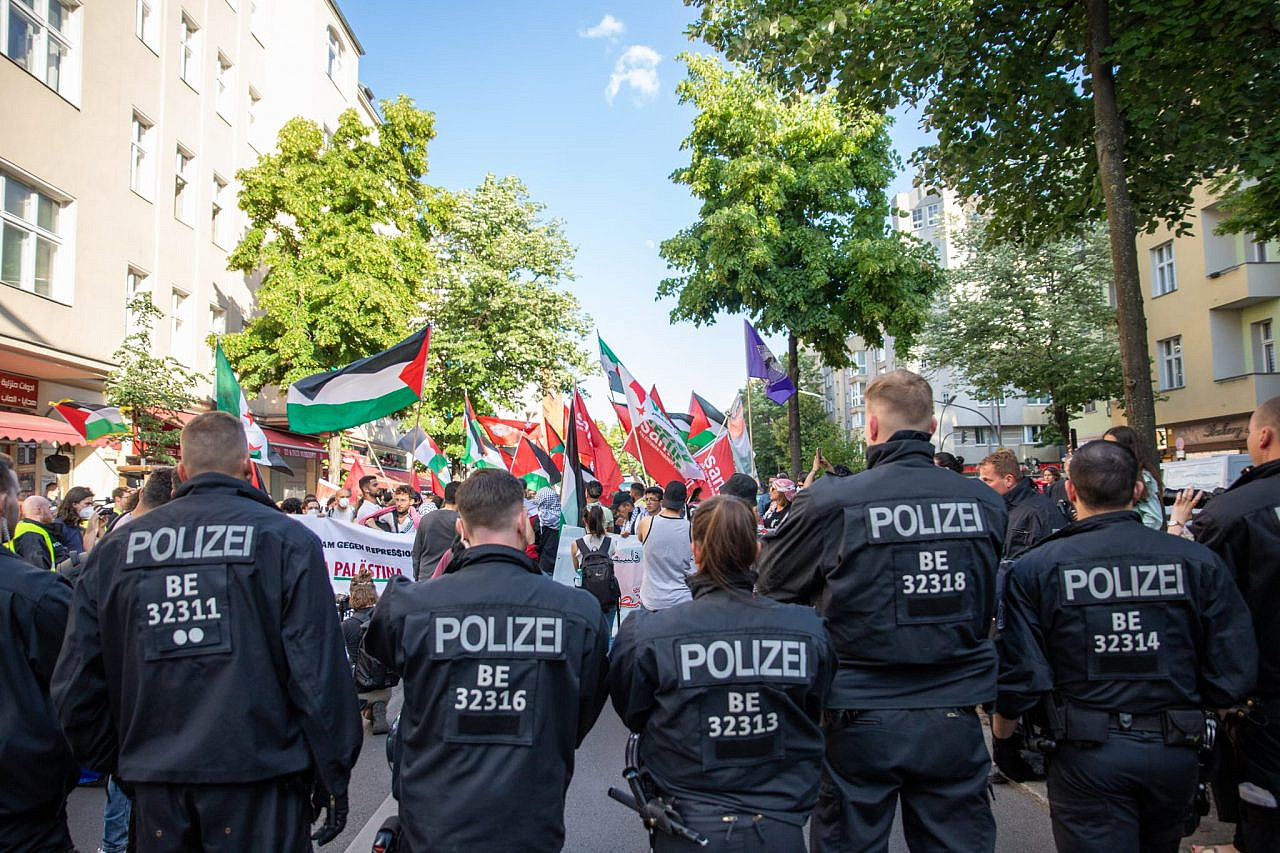The European Legal Support Center (ELSC), an organization working to defend the Palestine solidarity movement, released a major report on Tuesday titled “Suppressing Palestinian Rights Advocacy through the IHRA Working Definition of Antisemitism.” The report is based on 53 recorded incidents between 2017 and 2022 — focusing in particular on Germany, Austria, and the United Kingdom — in which advocates for Palestinian rights, or critics of Israel or Zionism, were targeted under the highly contentious definition promoted by the International Holocaust Remembrance Alliance (IHRA). According to the center, the report represents the “first case-based account of human rights violations” in Europe deriving from the definition.
Along with detailed documentation and legal analysis, the report highlights several short reflections from individuals who were targeted under the IHRA definition. One student activist in the UK described the definition as a “distraction tactic” that burned out Palestine advocates, causing him to feel “crippling anxiety of who I could even trust, as it felt like the IHRA definition was a mode of surveillance in my day-to-day life.” A German-Palestinian scholar who was disinvited from a panel discussion said “it has become impossible to voice any critical opinion about Israeli policies in public or in academia without the risk of losing your job, contract, funding or future employment opportunities.”
Advocates, scholars, and legal experts at ELSC and other organizations have long criticized the IHRA definition, arguing it redefines antisemitism by wrongly conflating criticism of Israel with anti-Jewish racism. Adopted by the IHRA in 2016, the “Working Definition” has been widely disseminated and embraced by numerous governments and institutions, despite having severe deficits. According to ELSC’s new report, the invocation of the definition almost exclusively targets Palestinian rights advocacy, harming Palestinian and Jewish activists in particular.
“The weaknesses of the ‘Working Definition’ are the gateway to its political instrumentalization,” explained Peter Ullrich, a scholar and researcher, in a 2019 expert opinion on the subject. “It can be used to abridge fundamental rights, particularly freedom of speech with respect to disfavoured positions on Israel. In contrast to what the designation “Working Definition” suggests, no further development of the definition to rectify these weaknesses is occurring.”

Although the definition is not legally binding, the report reveals that the majority of EU member states have endorsed the IHRA definition, and have used it as an “authoritative instrument” for categorizing antisemitic acts.
Alice Garcia, ELSC’s advocacy and communication manager, told +972 that the IHRA definition is essentially being treated as law. “The endorsement by institutions, and the way it is being promoted by them, has given the definition authoritative power,” she said. “For instance, the EU Commission is constantly branding the definition as ‘non-legally binding’ on one hand, but on the other hand, it recommends referencing the IHRA definition in legislation and using it to train judges and police officers through a handbook for its practical use. How much more binding can this be?”
The “non-binding” pretext, Garcia continued, “is being used to claim that the definition is not violating free speech. But a tool does not have to be codified in law to have concrete effects on fundamental rights.”
This ambiguous status of the IHRA definition has made it difficult for Palestine advocates to challenge the intensifying accusations of antisemitism directed at their political activism. In October 2022, the former UN special rapporteur on racism, E. Tendayi Achiume, stated that the IHRA definition has a de facto influence on the policy and practices of government and private actors, which have “contributed to violations of the human rights and freedom of expression, assembly and political participation.” She continued: “It is precisely the ‘soft law’ status of the working definition that effectively helps to undermine certain co-existent rights, without offering any remedy or means to legally challenge such violations.”
Criminalizing solidarity
Germany has recently seen a huge curtailment of Palestinian human rights under the shadow of the IHRA definition. This includes the banning of Nakba commemorations in Berlin last month; the mass dismissal of Arab employees at the state broadcaster Deutsche Welle for Palestine-related speech last year; numerous accounts of censorship of Palestinian and anti-Zionist activists spanning from artists to academics; and denying Palestine advocates access to public funding and public spaces.
In September 2017, the German Federal Government endorsed the IHRA definition by cabinet decision. In that same year, German municipal councils, with the support of all major political parties, had already begun to use the definition to pass resolutions against the Boycott, Divestment, and Sanctions (BDS) movement. Then, between 2018 and 2019, German state parliaments and the federal parliament followed suit with their own anti-BDS resolutions, sometimes explicitly referring to the IHRA definition, and sometimes borrowing language directly from the definition itself.
The Bundestag’s resolution of 2019 explicitly targeted the nonviolent Palestinian boycott movement as antisemitic, and called on the federal government not to extend support to events by the BDS movement and groups supporting its aims, and to abstain from funding projects that promote the boycott of Israel.
The number of German institutions and NGOs that have adopted the IHRA definition and referenced the Bundestag resolution are numerous. They include the Amadeu Antonio Foundation, the Jewish Student Union Germany (Jüdische Studierendenunion Deutschland, or JSUD), and the Department for Research and Information on Antisemitism (Recherche und Informationsstelle Antisemitismus, RIAS). RIAS is also the NGO that created a secret dossier on Anna-Esther Younes, a German Palestinian scholar of critical race studies, calling her an “antisemite, terrorist sympathizer and sexist.”
Most read on +972
Similar trends can be seen in Austria and the UK, with the implementation of the IHRA definition, and subsequent resolutions tied to it, having a “chilling effect” on freedom of expression related to Israel-Palestine, according to the ELSC report. Censorship of academics and advocates, rescinded job offers, and the cancellation of events featuring Palestine advocates can be seen in both countries.
In the UK, due to governmental pressure, more than 130 local councils and more than 200 institutions of higher education have adopted the IHRA definition of antisemitism. According to the report, in many cases the definition is invoked and consequently is now part of internal investigations and disciplinary proceedings of antisemitism.
Similar to Germany, Austria’s Federal Parliament unanimously passed an anti-BDS resolution, declaring it antisemitic. By 2021, the Federal Government incorporated the IHRA definition into its National Strategy against Antisemitism as the authoritative definition of antisemitism.

Still, Garcia emphasized that ELSC has had some success in pushing back against the definition. “When we assist individuals or groups in challenging the use of the definition — in university proceedings, for instance — we are successful because we manage to show the baselessness of the accusations and the bias with which the definition is being used,” she said.
“But this should not have to be the case,” Garcia stressed. “Institutions should just revoke any reference to the IHRA definition in their policies in order to end the repression faced by Palestinian rights advocates and the climate of censorship induced by it.”
Garcia and ELSC hope that the new study reaches advocates and institutions across Europe to help reverse the IHRA definition’s growing adoption. “We want to expose the European Commission’s ignorance, if not denial, of civil society concerns about the IHRA definition and its full entrenchment as EU policy. The EU has been failing in its core mission to protect fundamental rights despite the many warnings sent over the past years. Now it has to acknowledge the negative impact of its IHRA definition-based policies and act accordingly.”
While abandoning the IHRA definition does not mean anti-Palestinian repression would end, Garcia says that it would help in making it more difficult for anti-Palestinian groups to purport their unfounded allegations of antisemitism. “As we can see in the report, the IHRA definition has become a tool to legitimize smear campaigns and disciplinary sanctions or dismissals and other terrible consequences for individuals,” she said. “So, if at least our own institutions cease considering the IHRA definition as standard and stop integrating it in its policies, and instead accept its bias and harmful effects, then similar incidents to those described in the report should, hopefully, decrease.”






